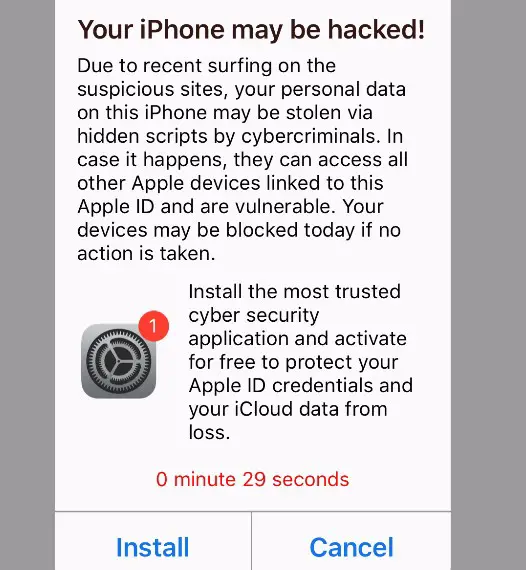Have you recently received an alert from Apple that has you confused? The Apple Security Alert scam is a phishing scam targeted at Apple device users. These scammers send fake alerts or messages claiming to be from Apple, warning users about a security issue or a compromised account. This scam aims to trick users into revealing sensitive information or installing malware.

How this Scam Works
Scammers send fake emails, texts, or pop-ups claiming to be from Apple. These messages often create a sense of urgency, warning users that their account has been compromised or that their device is infected with malware. The scammers then ask users to click on a suspicious link, provide sensitive information, or download a fake “security update.”
Red Flags Of The Apple Security Alert Scam
Unusual or unfamiliar logos
Scammers may use fake or altered logos to make their messages appear legitimate. Check the logo carefully to ensure it matches the company’s official branding.
Urgent or threatening language
Thes scammers often try to create a sense of urgency or fear to prompt users into taking action. Be cautious of messages that claim your account will be suspended or your device will be compromised if you don’t take immediate action.
Generic greetings
Scammers often use generic greetings like “Dear customer” instead of addressing you by your actual name. Legitimate companies usually address you by your name, especially if you have an account with them.
Suspicious links or attachments
Scammers may include links or attachments that lead to phishing websites or download malware onto your device. Be wary of links or attachments from unfamiliar sources.
Unusual or suspicious phone calls
Scammers may call you, claiming to be from Apple or another company, and ask for sensitive information. Legitimate companies will never ask for sensitive information over the phone.
Requests for personal or financial information
Legitimate companies, including Apple, will never ask for sensitive information like passwords, credit card numbers, or social security numbers via email, text, or phone call.
Request to download software or updates
Scammers may ask you to download software or updates that are actually malware. Legitimate companies will typically direct you to their official website or app store for downloads.
Poor grammar or spelling
Legitimate companies typically have professional communications. Scammers may have poor grammar, spelling, or punctuation in their messages.
How to Avoid Falling a Victim
- Use strong, unique passwords and enable two-factor authentication
- Verify the authenticity of the message through Apple’s official website or support channels
- Never provide sensitive information in response to an unsolicited message
- Be cautious of generic greetings instead of addressing you by your actual name
- Keep your Apple devices and software up-to-date with the latest security patches
What to Do if You Already Fell for this Scam
Monitoring Accounts and Credit Reports
- Check your bank and credit card statements: Look for any suspicious transactions or charges.
- Monitor your credit reports: Check your credit reports from the three major credit reporting agencies (Experian, TransUnion, and Equifax) for any unauthorized activity.
- Set up account alerts: Enable alerts on your bank and credit card accounts to notify you of any suspicious activity.
Securing Your Apple ID and Device
- Immediately change your Apple ID password: Go to the Apple ID website and change your password to a strong, unique one.
- Enable two-factor authentication (2FA): 2FA adds an extra layer of security to your Apple ID. You can enable it on the Apple ID website.
- Run a virus scan on your device: Use an anti-virus software to scan your device for any malware.
- Update your device’s operating system: Ensure your device is running the latest version of its operating system.
Reporting the Incident and Seeking Guidance
- Contact Apple Support: Reach out to Apple Support to report the incident and seek guidance on how to secure your account and device.
- Report the incident to the Federal Trade Commission (FTC): File a complaint with the FTC to help them track and prevent future scams.
- Notify your bank and credit card companies: Inform your bank and credit card companies about the scam, so they can monitor your accounts for any suspicious activity.
Additional Steps
- Keep an eye on your email and phone activity: Be cautious of any further phishing attempts or suspicious communications.
- Consider a credit freeze: If you’re concerned about identity theft, consider placing a credit freeze on your credit reports.
- Stay vigilant: Remain alert and cautious when receiving unsolicited communications, and never provide sensitive information unless you’re certain it’s a legitimate request.
By taking these steps, you can minimize the damage and help prevent further unauthorized activity.
Conclusion
The Apple Security Alert scam is a malicious phishing attempt that targets Apple device users. By being aware of the red flags and taking steps to avoid falling victim, you can protect yourself from this scam.
See latest alert – Steparian.com Reviews: Is The Steparian Clothing Store Legit Or A Scam?
